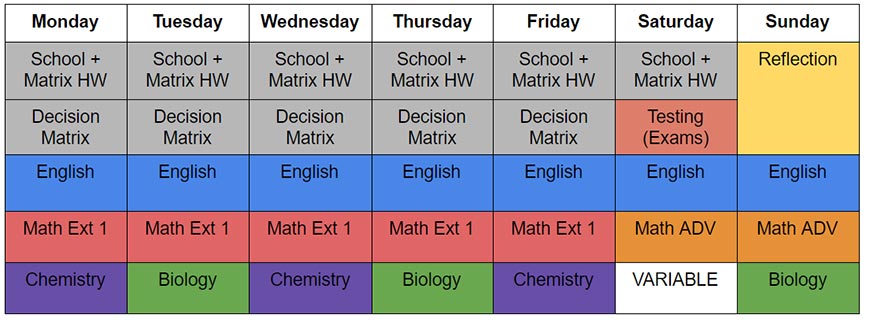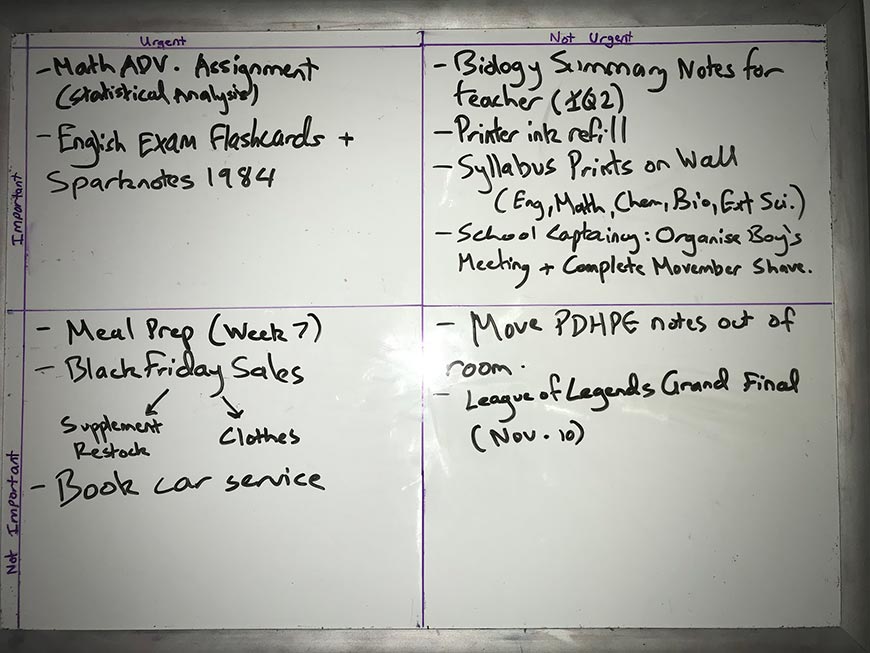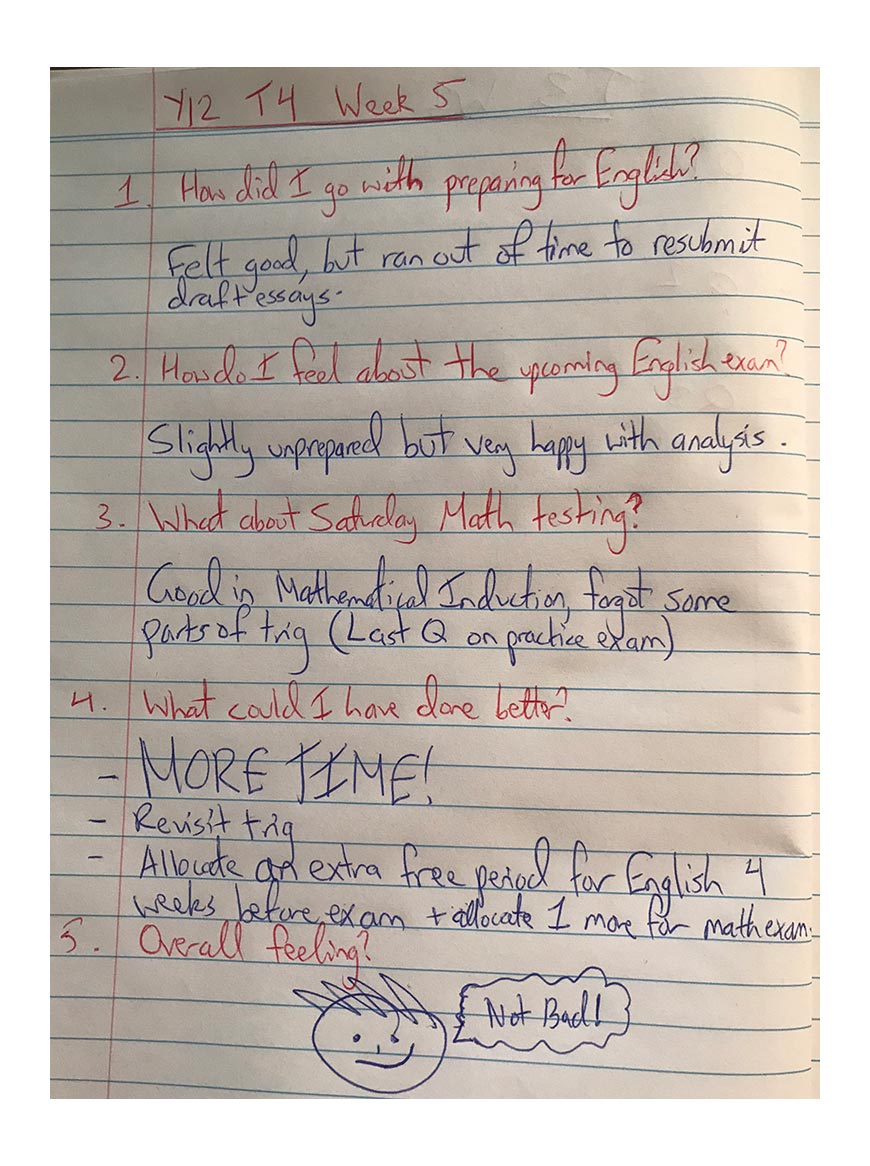Welcome to Matrix Education
To ensure we are showing you the most relevant content, please select your location below.
Select a year to see courses
Learn online or on-campus during the term or school holidays
Learn online or on-campus during the term or school holidays
Learn online or on-campus during the term or school holidays
Learn online or on-campus during the term or school holidays
Learn online or on-campus during the term or school holidays
Learn online or on-campus during the term or school holidays
Learn online or on-campus during the term or school holidays
Get HSC Trial exam ready in just a week
Get HSC exam ready in just a week
Select a year to see available courses
Science guides to help you get ahead
Science guides to help you get ahead
In this article, Eric shows you how to ace your HSC with weekly rhythms and a reflection book.

Join 75,893 students who already have a head start.
"*" indicates required fields

Join 8000+ students each term who already have a head start on their school academic journey.
Do you feel you could perform better at school if you could just be more organised? Well, you’re in luck! In this article, Matrix Scholarship student Eric Papadopolous shows you how to ace your HSC with weekly rhythms and a reflection book!
Eric Papadopoulos
Sylvania High School
Bachelor of Science and Bachelor of Advanced Studies (Dalyell Scholars) at The University of Sydney
96.00
Neuroscientist + Professional Speaker.
I’ve always been curious about asking the big questions:
And then it occurred to me that all these questions can be answered by delving into the ‘3-pound universe’ that is our brain.
I am hoping to further expand our knowledge on how we can optimise our cognitive intelligence and I would love to teach this information to the world as a speaker.
I enjoy learning about how chemicals interact with each other (and which chemicals make the biggest explosions!).
I found success by using a “calculations book” to record all the different types of calculation questions they can ask in exams.
I do this for even the most basic of calculations. You should do this, too, to ensure you don’t miss out on easy marks!
Check out these examples below:
I struggle to connect deeply with the text, impairing my ability to articulate any personal connections I share with the text.
However, I found the Matrix English Advanced term course has helped me combat this and it has provided me with a different perspective on the rubric, text and course on the whole.
Start HSC English confidently
Expert teachers, detailed feedback, one-to-one help! Learn from home with Matrix+ Online English courses.
How I use weekly rhythms and a book of mistakes to stay on top of my subjects
If you want to succeed, you need a weekly rhythm!
Your weekly rhythm is your best friend. It will motivate you, it will never judge you, it will become part of your family!
Every term and holiday period, I create a weekly rhythm that outlines the additional study I will do every night.
Here is my most recent rhythm:

So, let’s break this down:
Some people prefer to study before doing homework, but I find I like to complete as much homework as I can before studying. Most days, I complete my homework in my study periods and eliminate this column before getting home.
The Eisenhower Decision Matrix is an absolute lifesaver. We’ve all had to pull those one-nighters to finish an assignment because we either forgot about it or ran out of time!
Time is the most valuable asset in your HSC year and this decision matrix will sort everything out for you.
It works by prioritising tasks into four different categories (Urgent, Not Urgent, Important, Not Important).
For example, if a task is both urgent and important it MUST be done! If a task is both not urgent and not important, it is probably best you disregard it or complete it after completing all other tasks.
Here is my current Decision Matrix below:

(I like to define “urgent” as must be done in 2 weeks or less, and “important” as this will affect my school/HSC marks or it concerns important school events such as school captaincy) Everyone’s rhythms are completely different. It’s all about finding what suits you best.
On Saturday testing, I like to compile HSC questions on the content I have recently studied for English, Maths Ext 1 and the Science subject I struggle the most with at the time (either Chemistry or Biology) and complete a 1-hour exam on all three of them.
Don’t worry about marking these on Saturday, this will be done on Sunday instead! Then, after studying for English and Maths ADV, I have a “variable” study block that can include a particular subject I am struggling with or some extra break time on the weekend.
Reflection, reflection, reflection!
This is the most important time of the week.
All you have to do is mark your practice exams from Saturday and then answer these 3 questions in a little “reflection book”:
This is what mine looks like:

After this, you must put your answers into practice. If you didn’t feel that good, find out how to fix that!
If you couldn’t remember your English quotes, spend a little extra time revising them! Once you’ve figured out how to put your answers into practice, take the rest of the reflection block off – you’ve earned it.
I know many people who use different times for their blocks. Each ‘block’ is a cell on the rhythm, for example, the block labelled ‘English’ refers to one block of study time for English.
I like to study for 50 minutes with a 10-minute break, totalling each block to 1 hour long.
Other people prefer 30 minutes study, 5-minute break, 30 minutes study, 5-minute break.
Find what works best for you!
Pro Tip: Put time periods (e.g. 4:30-5:30pm) at the start of each row and stick an extra copy on the outside of your bedroom door so your parents won’t bother you!
Let’s face it. Stress. Year 12. They’re both synonymous.
But your ATAR is not the be all and end all, you’ll be okay!
Something that all the best students have in common is that they all understand the value of unwinding and they have practices in place to cope with stress.
Everyone has their own methods, but I find there is nothing more effective than going out with your friends, leaving your comfort zone and socialising every day.
Take a load off and celebrate your achievements. Even take 5 minutes to “meme up” your notes. Matrix has the right idea…
I completely regret giving up Rugby League for extra study time.
I didn’t think I could balance my sporting commitments with my HSC year, however, I was greatly mistaken.
I keep up with sports opportunities at School, but nothing beats it. If you enjoy an activity, make sure you set some time away for it in your week. It’s not worth giving it up if it makes you happy.
Written by Guest Author
We have regular contributions to our blog from our Tutor Team and high performing Matrix Students. Come back regularly for these guest posts to learn their study hacks and insights!© Matrix Education and www.matrix.edu.au, 2025. Unauthorised use and/or duplication of this material without express and written permission from this site’s author and/or owner is strictly prohibited. Excerpts and links may be used, provided that full and clear credit is given to Matrix Education and www.matrix.edu.au with appropriate and specific direction to the original content.